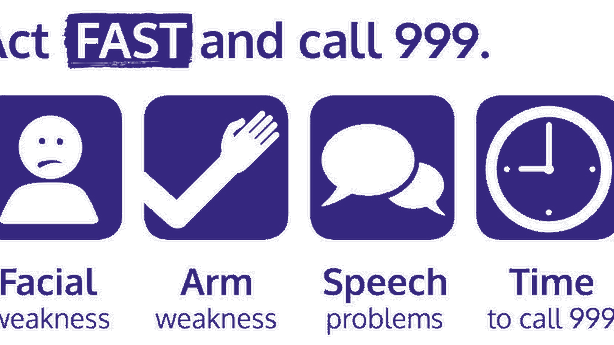
Press release -
Stroke concern rising amid Covid-19 crisis warns top charity
Concerns are mounting that people who have a stroke or TIA/mini-stroke (transient ischemic attack) are not calling 999 amid the coronavirus pandemic. With strokes continuing to strike across Wales at this time, the Stroke Association fears that thousands of people could be at risk of severe disability, or even stroke-related death, if they don’t Act FAST on stroke symptoms.
Dr Phil Jones, National Clinical lead for Stroke in Wales said, “I’ve been in contact with doctors in those countries ahead of us on the coronavirus curve, who told us that they had seen a sharp drop in the numbers of people presenting for stroke. It appears that people are not seeking emergency help or going to hospital when they suspect a stroke due to fear of the virus or not wanting to be a burden on the NHS. We can’t let this happen in Wales.”
“Stroke is a medical emergency and it’s essential that you call 999 straight away if you suspect you or someone around you is having a stroke. Our hospitals are equipped and ready to treat stroke patients. Given the emergency changes being made across the NHS, it’s possible that a patient’s treatment or journey might be a bit different while we put measures in place to deal with coronavirus safely. But these are to keep patients and NHS workers safe and the most important thing to remember is to dial 999 if you suspect a stroke.”
In 2019, there were 7,400 strokes in Wales and the charity warns that any delay in getting help will jeopardise your ability to rebuild your life after stroke.
While figures for emergency admissions in Wales aren’t available yet, the charity and senior stroke professionals report they are already seeing similar declines to those seen across the rest of the UK. Latest figures in England and Scotland showed attendance to Emergency Departments has dropped by over a third on the same week last year.
Carol Bott, Director of the Stroke Association in Wales, said, “The fear of contracting the virus or feeling like a burden on the NHS might be the main reasons putting people off seeking treatment. But I am reassured that the NHS is well equipped to treat both stroke and coronavirus. The best thing for you and the NHS, is to call 999 and say you (or the person in front of you) is having a stroke. Assume stroke until told otherwise.
“Equally concerning is people who experience mini-stroke and then dismiss it as ‘just a funny-turn’. A mini-stroke is a warning that major stroke is on its way, so you shouldn’t ignore the signs; and you need to seek help.
“By acting FAST and getting access to treatment, you can help save lives. Acting FAST can also reduce the misery for thousands of stroke survivors and their families and the impact on the NHS associated with stroke, as the UK’s leading cause of adult disability. Now more than ever, during this pandemic we must remain focused on making and keeping stroke a priority for the UK.”
The UK’s leading stroke charity is highlighting the world-famous stroke acronym, FAST, urging the public to familiarise themselves with the signs and symptoms of a stroke: Face, Arms, Speech and Time (to call an ambulance) – Act FAST. The signs of a TIA/mini-stroke are the same as a stroke, but only last up to 24 hours.
Professor Rustam Al-Shahi Salman, President of the British Association of Stroke Physicians (BASP) and honorary consultant neurologist in Edinburgh said: “Strokes and mini-strokes are medical emergencies. The quicker many stroke treatments are given, the better. As we say, “time is brain.” So it’s important to recognise the signs of a mini-stroke or stroke and act immediately. In this phase of social distancing during the COVID-19 pandemic, family and friends can do the FAST test on the phone or via video chat. Many stroke services have also adapted to the pandemic rapidly: rather than calling patients with mini-stroke up to a hospital outpatient appointment, they are using phone or video chat to diagnose and recommend treatment for patients.”
In 2001, the Stroke Association funded research to help paramedics spot the signs of stroke using the Face Arm Speech Time (to call an ambulance) test. This research lay the foundations for one of the most successful public health awareness campaigns in the UK, the Act FAST campaign. Symptoms such as facial drooping, arm weakness and speech difficulties are the most common, (but not exclusive), signs of a stroke.
Other signs of stroke can include
- Sudden weakness or numbness on one side of the body, including legs, hands or feet.
- Difficulty finding words or speaking in clear sentences.
- Sudden blurred vision or loss of sight in one or both eyes.
- Sudden memory loss or confusion, and dizziness or a sudden fall.
- A sudden, severe headache.
If you spot any one of these signs of a stroke, don't wait. Call 999 straight away.
For more information about stroke and the Act FAST campaign go to www.stroke.org.uk.
Topics
Categories
Regions
- Stroke strikes every five minutes in the UK and it changes lives in an instant.
- The Stroke Association is a charity working across the UK to support people to rebuild their lives after stroke. We believe that everyone deserves to live the best life they can after stroke. From local support services and groups, to online information and support, anyone affected by stroke can visit stroke.org.uk or call our dedicated Stroke Helpline on 0303 3033 100 to find out about support available locally.
- Our specialist support, research and campaigning are only possible with the courage and determination of the stroke community and the generosity of our supporters. With more donations and support, we can help rebuild even more lives.
- You can follow us on Twitter, Facebook and Instagram.











